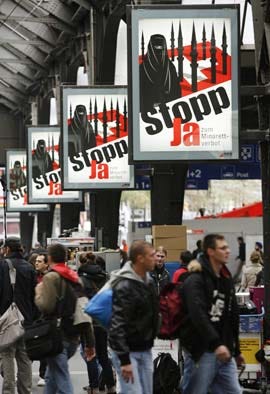Swiss Vote against Minarets and the Three Narratives
Narrative of victimization is a very easy one to create and build upon and use it to unleash unilateral terror on the rest of humanity and claim equivalence with peace-oriented narratives of others. Here is now it happens:
Narrative # 1: Explicitly desire that you want to push your ideology on the other guy and that the other guy swears by your ideology and that such a desire is an order of your god. Any action that bars such an action is sufficient and legitimate proof of “Victimization”.
Now, you add another layer of Narrative….
Narrative #2: That, if you are “Victimized”, you have enough and sufficient justification to Kill the “perpetrator” – the guy who wanted to NOT go by your desires of swearing by your ideology and bowing to your god.
Based on these two narratives, then, you go around killing people with impunity. And as others react.. you keep builiding on the “case” for more killing based firmly in the second narrative.
While some see “through” the obfuscation of these two narratives being played in tandom and point to the Anti-Peace and Anti-Humanity nature of your ideology… some seemingly well-meaning people in your camp unleash a third Narrative.
Narrative #3: The ideology is not “Anti-Peace” or against humanity as the Narrative #2 may suggest. Killing, your apologetics can argue, is a specialized punishment for those who “Harm” or “Victimize” you. Otherwise, its all “good”.
Very interesting play of three Narratives. If one argues against any of these narratives you are either:
– Branded Anti-Diversity and Conservative racist, if you and your “Armies” cannot enforce killing blatantly.
– Or, if you and your Armies can kill, then one is simply KILLED.
This is the predicament that the Swiss Voters faced this week when they voted on a referendum to ban Minarets of mosques in their country.
The Swiss People’s Party (a Nationalist Party), the largest party in parliament, had pushed for the national vote after labelling the mosque towers as symbols of militant Islam. Walter Wobmann, President of a committee backing the initiative pointed out that they did not want further “Islamization of Switzerland”.
To which , Taner Hatipoglu, President of Federation of Islamic Organizations in Zurich replied that this will “influence and change the relations to Muslims and their social integration in a negative way”. Thus providing a “good enough” argument for the hardliners to go ahead with implementing the Narrative #2 above, if they garner enough fire power and suicide bombers.
Many Europeans, most of them liberals, are very “disturbed” at this vote. To them, this indicates an increase of intolerance in the, hitherto, Liberal society of Switzerland.
But is it?
Until now, the protagonists of Islamic Organizations have only built arguments for putting their Ideology at par with all other ideologies – basically an attempt to posit Exclusivity at the same pedestal as the ideology of Inclusivity. If you let it happen, then very soon, the Me-too-at-par “Trojan Horse” will reveal hordes of Exclusivist “Moderates” touting Narrative #3 and Jehadis touting Narratives #1 and 2.
Robert of Jihad Watch, puts the entire arguments of the Three Narratives really well, in arguing about a different case. The verse in question below 9:5 says “But when the forbidden months are past, then fight and slay the Pagans wherever ye find them, an seize them, beleaguer them, and lie in wait for them in every stratagem (of war); but if they repent, and establish regular prayers and practise regular charity, then open the way for them: for Allah is Oft-forgiving, Most Merciful.” (Yusuf Ali)
The title of this naive and silly New York Times puff piece is “Three Clergymen, Three Faiths, One Friendship,” but from the looks of it, these “amigos” have one faith, not three — “the spirituality of interfaith relations.” At least Sheik Jamal Rahman is honest enough to acknowledge that there is a problem with the “Verse of the Sword” — Koran 9:5 — although he retails the same old tired glib dismissal that we have heard a thousand times before, that it is “taken out of context.”
What context would render it acceptable is seldom explained, although Islamic apologists in the West do often attempt to claim that it doesn’t apply to today or to any situation beyond the life of Muhammad, but rather refers narrowly to a time when the early Muslims were threatened with annihilation and had to fight back strongly in order to survive. The problem with this interpretation — which goes counter to the mainstream understanding of Islamic scholars in any case — is that instead of closing off the possibility of this verse (and other supporting verses) being used to justify jihad violence today, it plays right into the hands of the jihadists. For if this verse only applies to situations in which Muslims are in grave danger, such that Islam itself may not survive, they would argue — and do argue — that that is precisely the situation that prevails today. Accordingly, the interpretation that is supposed to mollify and reassure Westerners actually only opens the door for more jihad.
PS: Check below the post for the verses in Quran which justify Violence almost all against ‘Unbelievers”.
Reference Links:
1. Swiss vote to ban new mosque minarets
2. “But we have to acknowledge that ‘kill the unbelievers’ is an awkward verse”
Quranic Verses Justifying Violence
2:193, 8:39, 8:73, 85:10, 9:14-15, 8:17, 9:13, 2:251, 2:154, 9:19, 9:11, 9:120, 2:44, 8:72, 9:38, 33:36, 4:89, 9:12, 2:178, 5:45, 42:39, 5:33, 8:12, 47:4, 9:5, 2:190-194, 2:216-218, 3:167-175, 4:66, 4:74-78, 4:95-96, 4:104, 5:54, 6:162, 8:12-16, 8:38-40, 8:57-62, 8:65-66, 8:72-75, 9:12-14, 9:19-21, 9:29, 9:36, 9:39, 9:44-46, 9:52, 9:81, 9:36-38, 9:93-94, 9:100, 9:123, 16:110, 22:39-40, 22:58, 25:68, 26:227, 33:25, 33:60-62, 47:20-21, 47:35, 48:16-22, 48:29, 49:9-10, 49:15, 57:10-11, 59:13-14, 61:4, 61:11-12, 73:20




